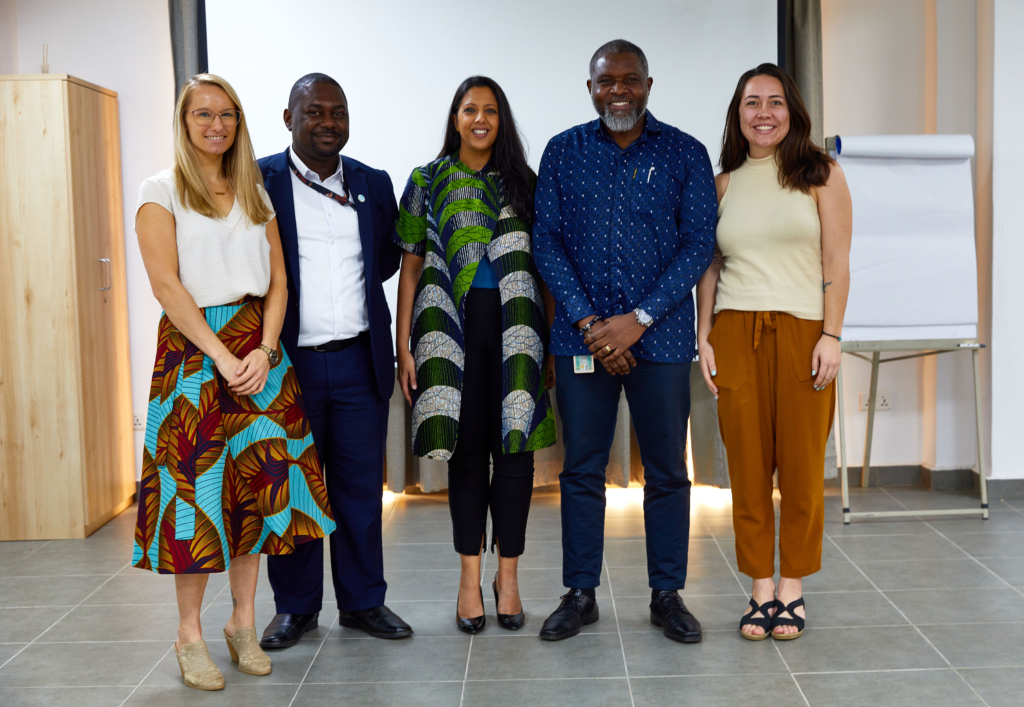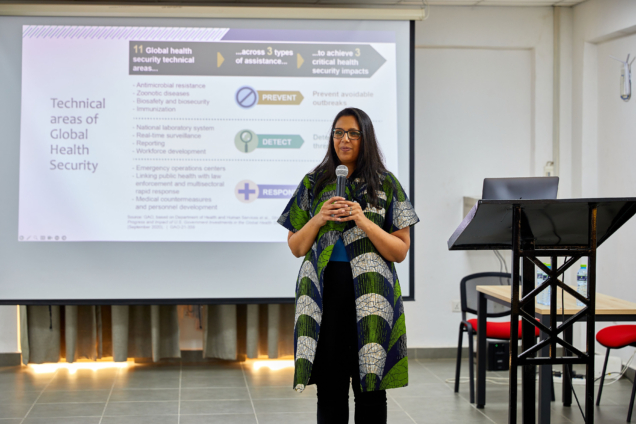Dr Bhakti Hansoti, Director for the Centre of Global Emergency Care, Johns Hopkins University is highlighting the critical role preparedness and investment in health systems play in improving local and global health security.
She explains that COVID-19 "was not just a global health emergency, but a demonstration that there is no health security without a resilient health system".
“If we build resilient health systems and a health system that is informed by these determinants of health, we can be strengthened against future threats,” she added.
Dr Bhakti Hansoti was delivering a lecture on “The Global Health Security: Implications for LMICs” at the Kumasi Center for Collaborative Research in Tropical Medicine to a diverse audience of professionals, scientists, students, clinicians, laboratory technologists and others.
According to the U.S. Department of Health and Human Services (HHS), “Global health security is achieved when all countries possess strong and resilient public health systems that can effectively prevent, detect, and respond to infectious disease threats, ensuring the health and well-being of populations globally”.
Today, global health security risks include emergence and spread of new infectious diseases; ever-increasing globalisation of travel and trade, enabling disease to spread; rise of drug-resistant, disease-causing pathogens; potential for accidental release, theft, or illicit use of dangerous pathogens among others.
The COVID-19 pandemic underscores the need for robust global health security measures, collaboration, and ethical responses to protect humanity.
Dr Bansoti explained that global health security requires intersectoral collaboration with active participation from countries to shape future response activities.
She said, “There is a need for intersectoral collaboration, communication, and investment. Countries must bring themselves to the table so that they can shape the dialogue for future response activities and future treaties such as the pandemic treaty.”
“We need to learn from the lessons of our past. We need to learn from Ebola, COVID-19, and HIV.
“What worked? How were communities engaged?
“What were the challenges, was it around capacity or optimisation?”
“How can those lessons be acknowledged, reflected upon, and scaled so our next response is stronger.”

Dr John Amuasi, Head of Global Health Department at the School of Public health and Leader for the Global Health and Infectious Disease Research Group was excited to have his students attend the lecture.
“This lecture was very important because the topic is one that is not usual but then very important.
“It is important that people in science, especially students, understand the global health architecture and the role Global Health Security plays in there.”
He further explained, “I am excited that students from the School of Public Health could be a part of this.
“It broadens their horizons, and it opens their minds to the global way of thinking about issues particularly around emerging and re-emerging infectious diseases and what that means for low middle-income countries in positioning ourselves well, so we are not short-changed in Global discussions like the pandemic treaty.”
Charles Lwanga Tengan, a member of the Global Health MPH class said, “I have learnt that there is no health security without a resilient health system.”
“I am truly pleased to have attended this lecture. Dr Bhakti Hansoti was quite inspirational."
“We are very grateful to have had this lecture coming through and it has given us a lot of insight into global health security," said Dr Joseph Bonney, president of the African Federation for Emergency Medicine and research fellow with the Global Health and Infectious Diseases research group.
He added, “As people that are building capacity, it was very great to know that capacity built in hospitals through basic emergency care and through other training programmes, can actually have a space in building a stronger ecosystem for global health security.”
Latest Stories
-
School Feeding Caterers begin receiving outstanding salaries
21 seconds -
Some NPP MPs advocate for OPK’s inclusion in 9th Parliament whip team
35 minutes -
Accountability key to eliminating impunity – Zanetor Rawlings
43 minutes -
Daily Insight for CEOs: How CEOs can lead digital transformation efforts
47 minutes -
CETAG declares indefinite strike over unresolved labour issues
1 hour -
Why the NPP’s Mass Expulsions will only Hurt the Party More
1 hour -
Zimbabwe abolishes death penalty
2 hours -
CCTV shows how burglar carried out £10m jewellery heist
2 hours -
Cybertruck filled with fuel and fireworks explodes at Trump’s Las Vegas hotel
2 hours -
National mourning after mass shooting in Montenegro
2 hours -
Dr Siaw Agyepong spreads joy on New Year’s day as thousands receive donations
2 hours -
Harnessing Citizen Wisdom for National Development
2 hours -
Fire destroys Kantamanto Market, displaces hundreds of traders
3 hours -
Leprosy Aid Committee pays tribute to Dr. Bawumia for his benevolence towards lepers
4 hours -
I thank God for what he has done for me and the nation – Bawumia to congregation
6 hours

